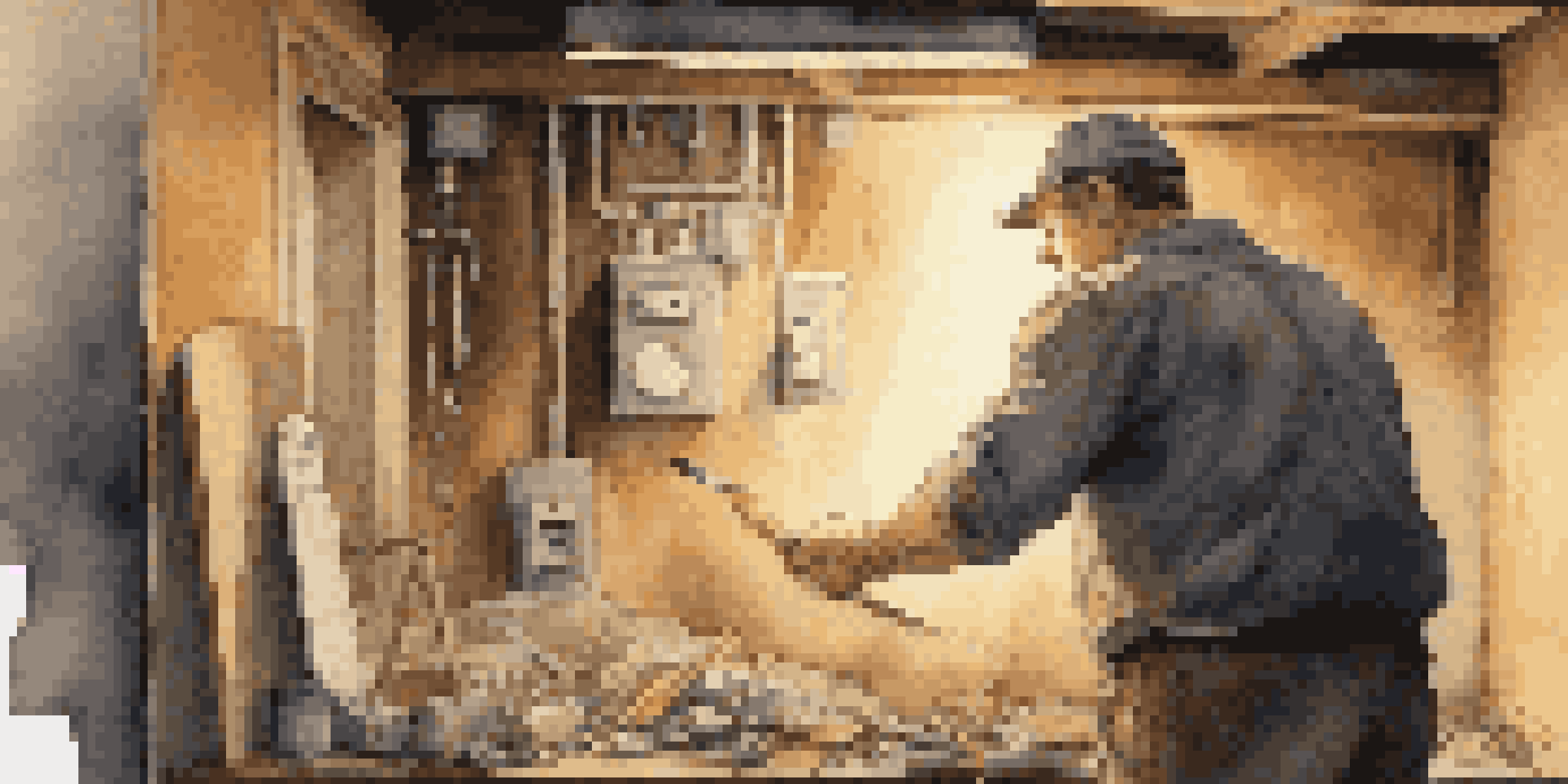Home Inspectors: Ensuring Transparency in Property Transactions

Understanding the Role of Home Inspectors
Home inspectors are vital players in the real estate transaction process. They evaluate the condition of a property to help buyers make informed decisions. By identifying potential issues, inspectors provide transparency that can save buyers from unwanted surprises later on.
An investment in knowledge always pays the best interest.
Their assessments cover everything from the roof to the foundation, ensuring that nothing is overlooked. This thorough examination acts as a safeguard against costly repairs or safety hazards. Ultimately, home inspectors help to level the playing field between buyers and sellers.
In a way, you can think of home inspectors as the detectives of real estate. They dig deep to uncover the hidden truths of a property, giving buyers confidence in their investment. Without their expertise, many would be left in the dark about what they are purchasing.
The Importance of Transparency in Property Transactions
Transparency is crucial in property transactions, as it builds trust between buyers and sellers. When both parties are aware of a property's condition, negotiations can proceed on fair terms. This clarity also helps avoid disputes that can arise from undisclosed issues.

For buyers, knowing what they are getting into can mean the difference between a dream home and a money pit. With a clear understanding of a property's strengths and weaknesses, buyers can make choices that align with their long-term goals. Sellers benefit too, as transparency can lead to quicker sales and more satisfied customers.
Home Inspectors Ensure Informed Decisions
Home inspectors evaluate a property's condition, helping buyers avoid costly surprises and make confident choices.
In this way, transparency acts as a bridge between buyer and seller, fostering a healthier marketplace. Just like in any relationship, open communication is key to success. Home inspectors play a vital role in facilitating this exchange.
What Home Inspectors Look For
During a home inspection, professionals evaluate various components of a property. This includes the electrical systems, plumbing, roofing, and even the HVAC systems. By checking these systems, inspectors can identify potential risks that might not be visible during a casual viewing.
The bitterness of poor quality remains long after the sweetness of low price is forgotten.
In addition to structural issues, inspectors also look for safety hazards, such as mold or faulty wiring. These findings can be crucial for protecting the health and safety of future occupants. A thorough inspection can uncover problems that could lead to significant expenses if left unaddressed.
Think of the inspection process as a health check-up for your home. Just as you would want to know about any medical issues, a home inspection reveals the underlying conditions of the property. This knowledge empowers buyers to make better choices.
The Home Inspection Process Explained
The home inspection process typically begins with the buyer scheduling an appointment. This is often done after an offer is accepted but before closing the deal. The inspector will then conduct a detailed walk-through, usually lasting two to three hours.
After the inspection, buyers receive a comprehensive report outlining the findings. This document serves as a guide for potential repairs and maintenance. With this critical information at hand, buyers can negotiate repairs or price adjustments with the seller.
Transparency Builds Trust in Deals
Clear communication about a property's issues fosters trust between buyers and sellers, leading to smoother transactions.
Navigating the inspection process can feel overwhelming, but it's a crucial step in ensuring a wise investment. Just like preparing for an exam, being informed and ready can make a world of difference. An informed buyer is a confident buyer.
Choosing the Right Home Inspector
Selecting a qualified home inspector can significantly impact the transparency of a property transaction. It's essential to do your research and choose someone with relevant experience and certifications. Reading reviews and asking for recommendations can help you find a trustworthy inspector.
A good home inspector will not only have technical knowledge but also strong communication skills. They should be able to explain their findings in a clear and approachable manner, ensuring that you fully understand any issues. This clarity is vital for making informed decisions.
Think of choosing an inspector as selecting a guide for an unfamiliar journey. You want someone who knows the terrain and can offer insights along the way. The right home inspector can help illuminate the path to your new home.
Common Myths About Home Inspections
There are several myths surrounding home inspections that can mislead buyers. One common misconception is that a home inspection is a pass/fail test. In reality, it's more of an assessment that highlights potential issues rather than a definitive judgment on the property.
Another myth is that new homes do not require inspections. Even newly constructed homes can have problems that may go unnoticed without a thorough examination. Buyers should remain vigilant and not assume that everything is perfect just because a home is new.
Inspections Save Money Long-Term
Investing in a home inspection can uncover issues before closing, allowing buyers to negotiate repairs and budget for future maintenance.
Debunking these myths can help buyers approach the inspection process with realistic expectations. Just like with any important decision, being well-informed is key to navigating the complexities of home buying. Knowledge is power in the world of real estate.
The Financial Benefits of Home Inspections
Investing in a home inspection can save buyers significant amounts of money in the long run. By identifying issues before closing, buyers can negotiate repairs or a lower purchase price. This proactive approach can prevent unexpected expenses after moving in.
Moreover, knowing the condition of a property helps buyers plan for future maintenance. Understanding what repairs may be needed soon can assist in budgeting for homeownership. This foresight allows homeowners to avoid financial surprises and manage their investments effectively.

Think of a home inspection as an insurance policy for your investment. While it requires an upfront cost, the potential savings and peace of mind it offers can be invaluable. It's a smart financial decision that pays off in the long term.